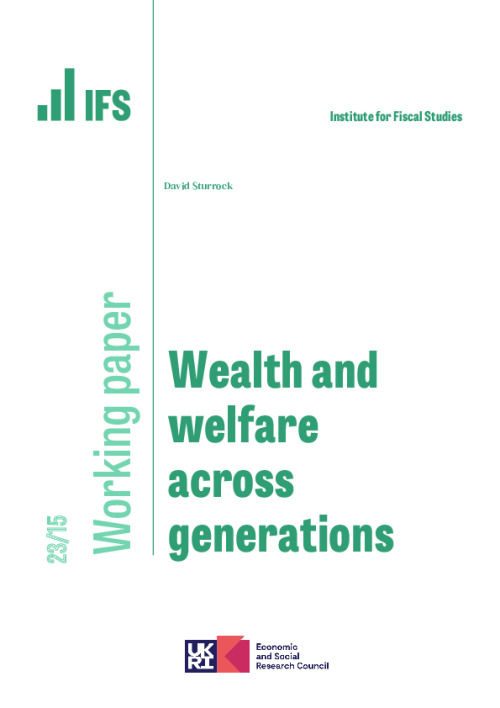Downloads

WP202315-Wealth-and-welfare-across-generations.pdf
PDF | 1.67 MB
Although older generations have substantially more wealth than their recent predecessors did at the same age, younger generations do not. Bringing together UK data on those born between the 1930s and 1980s and a lifecycle model of saving, I quantify whether this is due to changes in preferences or changes in the circumstances each generation has faced. Changing circumstances can rationalise slowing generation-on-generation wealth growth. I find no evidence that later-born generations are less patient. I quantify the implications of changing circumstances for consumption and welfare. Later-born generations are predicted to have higher consumption, despite accumulating no greater wealth, than their predecessors because their earnings are more ‘backloaded’, they have fewer children, and face lower taxation.
Authors

Senior Research Economist
David’s research covers household wealth, intergenerational transfers, social mobility, pensions taxation, and health and work at older ages.
Working Paper details
- DOI
- 10.1920/wp.ifs.2023.1523
- Publisher
- Institute for Fiscal Studies
Suggested citation
Sturrock, D. (2023). Wealth and welfare across generations. 23/15. London: Institute for Fiscal Studies. Available at: https://ifs.org.uk/publications/wealth-and-welfare-across-generations (accessed: 30 June 2024).
More from IFS
Understand this issue

Why inheritance tax should be reformed
18 January 2024

Raising revenue from closing inheritance tax loopholes
18 April 2024

Sure Start achieved its aims, then we threw it away
15 April 2024
Policy analysis

Making mortgage guarantees permanent will help some first-time buyers, but only if they can afford a bigger mortgage
6 June 2024

How do the last five years measure up on levelling up?
19 June 2024

The Conservatives and the Economy, 2010–24
3 June 2024
Academic research

Income inequality in Ireland, 1987–2019
28 June 2024

Components of the evolution of income inequality in Sweden, 1990–2021
28 June 2024

The impact of labour demand shocks when occupational labour supplies are heterogeneous
28 June 2024